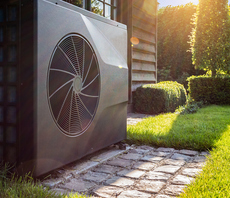More UK policy support needed to make heat pumps affordable, academics warn


Potential for reductions in heat pump costs may be more limited than the government envisages, according to the UK Energy Research Centre (UKERC)
Academics have called for a strong policy focus on making heat pumps more affordable for British households, amid concerns has been little or no reduction in the average cost of a heat pump installed in the UK over the past decade.
Fresh research published today by the UK Energy Research Centre (UKERC) found that while some countries have successfully aligned heat pump market growth with reduced costs, overall cost reductions for the technology have to date still been modest.
UKERC said there were now realistic prospects that heat pump prices could fall in UK, thanks to growing industry, consumer and political impetus for decarbonising domestic heating, but it warned that cost improvements were still “unlikely” to be at the scale and speed envisaged in the government’s plans, which include a target for 600,000 heat pump installations per year by 2028.
Published in autumn 2021, the government’s Heat and Buildings Strategy states a ‘clear ambition’ to cut UK heat pump costs by between 25-50 per cent by 2025, and for installing and operating heat pumps to achieve price parity with gas boilers by 2030.
However, UKERC notes that most forecasts suggest a decline in purchase and installation costs of 20-25 per cent by 2030 is more likely, which it said was “roughly half” the level of price reduction envisaged by the government, leaving ambitions of achieving with price parity with gas boilers “a long way off”.
In fact, given growing international demand and supply side challenges for heat pumps, it warned that costs could even still rise further.
“To realise the low-carbon heating transition it is vital that government focuses effort on bringing heat pump costs down,” urged professor Rob Gross, director of UKERC. “Well-designed and sustained policy support will be a critical enabler of deployment growth and price reductions. A key action that could be taken right away is to bring forward the proposed shift of legacy charges from electricity to gas, reducing heat pump operational costs.”
The research also highlights how the cost of new domestic boilers and heat pumps “vary widely”, with typical estimates being around £3,000 for a gas boiler and £10,000 for an air-to-water heat pump.
UKERC explained that achieving installed cost parity with gas boilers would therefore require a 70 per cent reduction in costs for heat pumps. And while the government’s Boiler Upgrade household grant scheme has been extended to 2028, which is expected to effectively halve the cost of a heat pump through grants of up to £5,000, a further 40 per cent reduction in costs would still be required to achieve parity with gas boilers, according to UKERC.
However, the researchers also acknowledged that installation accounts for only one aspect of the total cost of a heat pump, noting that should electricity costs fall it could then make heat pumps cheaper to run than boilers, thanks to the higher costs and risks associated with fossil fuel heating.
To that end, the government last week confirmed it plans to rebalance gas and electricity bills by shifting policy costs for fuel poverty support and renewables incentives onto gas bills, rather than being paid for by electricity billpayers. It said the move – which was welcomed by UKERC – would help to make low carbon electric heating solutions, such as heat pumps, a more affordable and attractive option for households and businesses.
UKERC also noted the wider benefits offered by heat pumps compared to gas boilers, including the reductions in overall energy demand and improved energy security the appliances can deliver due to reduced reliance on fossil fuels. Over time, particularly if electricity supplies become less reliant on gas, UKREC said households with heat pumps could enjoy lower and more stable heating costs.
As such, UKREC urged the government to develop a more supportive policy environment to ensure that milestones are met by strengthening the UK’s heat pump supply chains as well as doing more to remove affordability barriers.
“This research highlights how it is important to consider the evidence and draw on international experiences and lessons from other technologies,” said co-author Dr Phil Heptonstall. “By doing so it is possible to develop policies that will drive high quality and lower cost heat pump installations in the UK.”
It follows research by the International Energy Agency last week which found global sales of heat pumps have enjoyed double digit growth for the second year running, with sales in Europe in particular in 2022 surging by almost 40 per cent.








